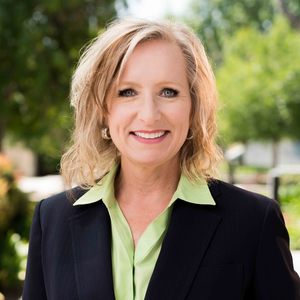Crowell School of Business Professor Helen M. Mitchell was recently a guest on the SheWorks4Him podcast, where she talked about coming to Christ, her growth and life challenges, her insights into the theology of work, the complexities of being a woman in the workforce, and how she tries to impact the future leaders in her classroom. Mitchell is Crowell’s assistant professor of leadership and ethics and also the director of Biola’s Talbot School of Theology Center for Faith, Work and Economics.
“I try to tell my students that, for Christians, the words work and ministry ought to be synonyms,” she said. “Ministry in the Greek means service. Ministry is not a job title, a job description, occupation, or industry. It's a way of life for a follower of Jesus Christ. My friend, Jim Woodward from Dallas, defines work as anything that provides value for self or others. So work can be a mother changing a baby's diaper — she is ministering to, or serving, that child.”
Mitchell has no doubt that there are still challenges in the workplace that are unique to women.
“One of the biggest challenges that I see [for women in business] is this idea of homographic reproduction, a term a female Harvard professor came up with, which means that people tend to reproduce people who look like themselves, intentionally or not,” said Mitchell. “So whether the good-old-boy network happens intentionally or unintentionally, it happens, and women get left out. I remember noticing how the male boss was only going to lunch with the guys. When I was an executive at AT&T, we would notice a pattern of up-and-coming male leaders who looked the part but weren’t that sharp or even the best person for the job.”
However, for Mitchell, there’s more to it.
“But we need to remember, because sometimes as women we use that as an excuse: ‘Well, I'm not at the table of influence because I'm a woman’,” said Mitchell. “I think before I jump to that conclusion, I first need to stop and reflect on myself and ask, ‘How am I showing up? Do I have the competence and the knowledge and the character to hold that calling? Do I get along with other people? Do I make myself safe? Or am I catty and gossipy? Am I difficult to work with?’”
To Mitchell, the key for women is understanding how God sees you.
“In Genesis 2:18, God says, ‘I will make a helper — or a helpmate — for him.’ Now, I was always bothered by that word helper. It never felt it fit me, like that meant I couldn’t be a leader. But what I found out is, the Hebrew for helper is used 21 times in the Old Testament and it means the one who helps. It often describes King David and God himself. It’s even in Psalm 121, where it says,
‘I lift up my eyes to the hills. From where does my help come?
My help comes from the Lord, who made heaven and earth.’
There, the Lord is the helper, and He is certainly not inferior to anyone. So I say to ladies, ‘you are not superior, and you are not inferior to men. You are different. You are created to be equal, to co-labor with men on the earth, in the household, in the community and in the world. You are not an afterthought. You are dearly beloved.’ And so if we start with that as our identity, start with Jesus, then regardless of our job title, if we follow Him and honor Him and walk close to Him, I promise you, He will break down those barriers.”
Watch the entire interview here:
Mitchell is also an author, speaker, and leadership and strategy coach. She started her business career with AT&T, becoming an Area Vice President with Lucent Technologies at the age of 30 and holding multiple leadership roles. As an early adopter of faith, work and economics in the local church and a licensed minister on the pastoral staff, she was the architect and visionary of the Saddleback@Work ministry at Saddleback Church, which resulted in over 300 “faith at work” small groups meeting in workplaces across Southern California.
Learn more about the Crowell MA in Leadership and Innovation.
 Biola University
Biola University



.jpg)
.jpg)
